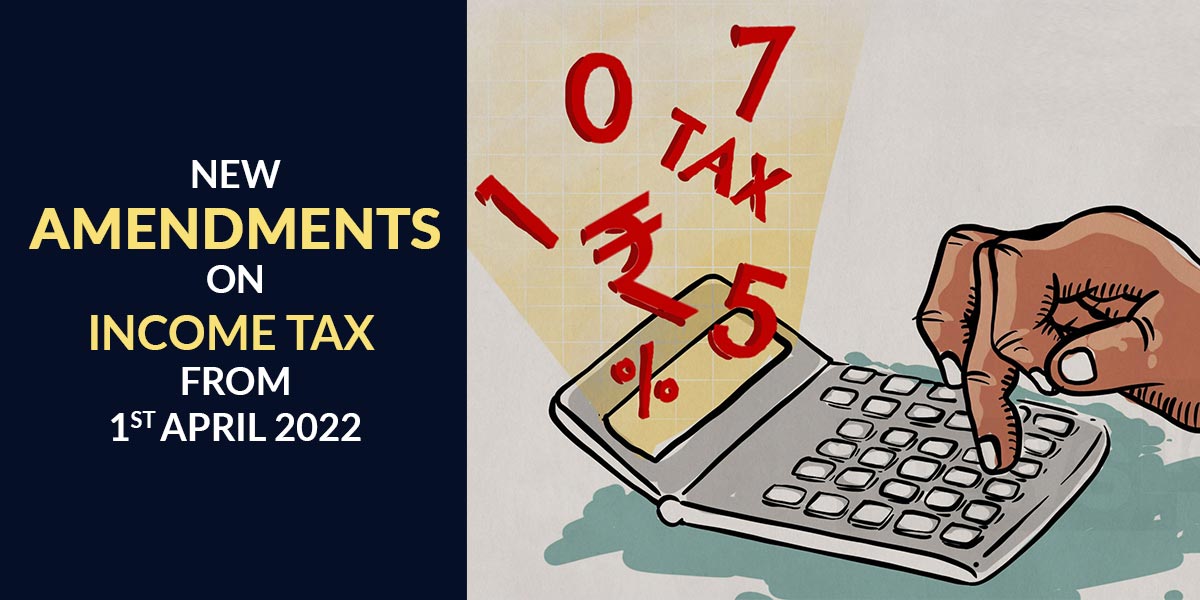
There are various amendments in the tax rules effective from 1st April 2022, where I would discuss the new tax rules on EPF interest, Taxation of Virtual Digital Assets, Filing of Updated IT Return, and Tax relief on Covid-19 treatment expenses and compensation.
Updated ITR Filing
Before that, one will have a window of 5 months from the left date of return filing, to amend the tax returns. There is a new law which is been made that permits filing updated income tax returns within a duration of 2 years from the finish of the suitable assessment year. But, the updated return would not be furnished to report another loss or reduction in the tax liability. The same law is introduced to furnish the opportunity to draw loss or undisclosed income or any additional error leading to lower tax filing in the original tax return.
When reporting this income the assessee is needed to furnish more tax at a 25% rate if the updated return has been furnished between 1 to 12 months (1st year) or 50% on the extra tax if the updated return is furnished between 13 to 24 months (2nd year) from the finish of the concerned assessment year. The same tax is needed to be furnished prior to filing the updated tax return and proof to that extent is needed to be attached during updated return filing.
Govt Employees to Claim Deduction U/S 80CCD(2) for NPS Contribution
The deductions can be claimed by the employees of the state government employees under the Section 80CCD(2) for NPS contribution by the employer to 14 per cent of the basic salary and also the dearness allowance, and that is according to the deduction which is also available for the Central government employees in the same section.
Employees PF Interest Latest Tax Rules
Wef April 1, the tax would be levied on the earned interest on the contribution to the Employees Provident Fund (EPF) when the amount is in excess of the threshold limit of Rs 2.5 lakh every year. The same rule is controlled beneath section 9D of the income tax act.
Towards the calculation, there is no tax on the contribution to the PF accounts up to Rs 2.5 lakh. However, when the employee contributes in excess of the provided above limit, the tax levied on the interest section is earned on the surplus contribution. The same is essential to see that only the interest amount on the surplus contribution would be acknowledged for the computation of the tax and not on the amount.
The same rule is been incorporated pointing to the high-class assessee, stopping them from obtaining the benefits of the government’s scheme. As they will park their excess funds in EPF to make the interest tax-free. But, low and the middle-class assessee would not be affected by this regulation.
For instance, when the employee contributes Rs 5 lakhs to EPF in a year, from that Rs 2.5 lakhs would be subjected to tax on that section would be taxed in the hands of the employee year after year.
Covid-19 Treatment Expenses & Compensation Tax Relief
Under the press release on June 2021, the tax privilege has been furnished to the individual who obtain the money for Covid medical treatment. Similar to that the money that is obtained by the family members on the person’s death because of covid would be privileged up to Rs 10 lakh for the family members when this payment is obtained in 12 months from the death date. The same revision would be effective from the date 1st April 2020.
Provision for Virtual Digital Assets Taxation
Union Budget 2022 circulates a specific tax provision for virtual digital assets (VDA). The government said that any income from the transfer/sale of any virtual digital asset such as bitcoin, cryptocurrencies, non-fungible tokens (NFTs) shall be taxed at the rate of 30% plus cess and surcharges, and it indeed asked to include a provision for TDS that would come beneath section 194S to the act where it furnished for the tax deduction on the payment for the transfer of the virtual digital assets to the resident with 1% rate of these considerations mentioned a financial limit.
Tax Exemption for Disabled Persons
The Indian government offers tax relief in an insurance scheme for disabled persons, so the parent or guardians of differently-abled people can also avail this policy